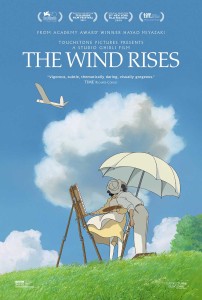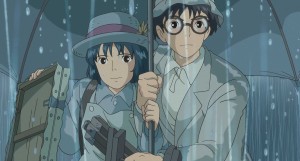Writer: Hayao Miyazaki
Cast: Hideaki Anno (Japanese language), Joseph Gordon-Levitt, John Krasinski, Emily Blunt, Martin Short, Werner Herzog, Stanley Tucci (English language dub)
Cert: PG
Running time: 126mins
Year: 2013

The lowdown: Japanese animation legend Hayao Miyazaki has declared The Wind Rises, his 11th feature film, to be his last. Miyazaki has made this claim six times before, but this latest work seems like the grace note of a remarkable career. His themes of nature, love, war, pacifism and, above all, flying form the core of this fictionalised (romanticised) account of aeronautical engineer Jiro Horikoshi and his dream to build Japan’s finest plane. That said plane eventually became the lethal Zero fighter of World War 2 has added a frisson of controversy to the master’s swansong.
The full verdict: The Wind Rises begins with Jiro Horikoshi as a boy, dreaming of fantastical flying machines. A fitting opening to the final film of a director whose greatest obsession has been depicting the joyous freedom in soaring through the heavens.
That this dream turns into a nightmare when a zeppelin disgorges faceless black warriors ties into Miyazaki’s career-long despair at mankind’s inability to reject war.
Ostensibly based on the life story of the Zero fighter inventor, Miyazaki also draws on the work of writer Tatsuo Hori, specifically a novel entitled The Wind Has Risen, plus his own biography.
Miyazaki’s father was director of Miyazaki Airplane, which supplied rudders for Zero fighters during WW2, and like Horikoshi’s (fictionalised) wife’s tuberculosis in The Wind Rises, Miyazaki’s mother too was stricken with TB.
The film (adapted by the director from his own comic) also traces Japan through the 1920s and into the mid-30s, when the winds of nationalism and militarism grew inexorably stronger and would culminate in the country’s entry into world war.
Horikoshi’s train journey from the countryside to Tokyo, where he will study aeronautics and rise through the ranks at Mitsubishi, is interrupted by the Great Tokyo Earthquake of 1923. Depicted with surreal, earth-swelling destruction by Miyazaki, the earthquake and subsequent firestorms are a vision of destruction still to come.
Miyazaki peppers his film with such dark omens, typically prefigured by a rising wind. But, acknowledging nature (and mankind’s) ability to perform wondrous deeds, he also has Jiro’s love Nahoko literally blow back into his life after a brief encounter in the earthquake.
Depicted as a driven dreamer, Jiro is obsessed with moving Japan out of the primitive era of wooden planes. Boyish and brilliant, Miyazaki clearly admires Horikoshi’s achievements in propelling Japanese aeronautics. But his central figure lacks the spark brought to the female leads of such masterworks as Nausicaa and Spirited Away (or indeed the male lead of Porco Rosso).
Disappointingly, The Wind Rises may feature Miyazaki’s most thinly sketched female characters. Nahoko patiently succumbs to TB while Jiro pulls all-nighters on his designs and has a more rewarding (imaginary) relationship with his idol, Italian engineer Caproni.
Then there is the controversy. In his native land, the director has been criticised by the left for focussing on Horikoshi at all and branded a “traitor” by the right for his criticism of the period.
To Western eyes, these criticisms seem coy indeed. Japan’s military spending starving its people and the destructive Nazi alliance, a subplot involving a Kempeitai (secret police) investigation into Horikoshi, and an epilogue depicting him lamenting the sacrifice of his plane to a futile war seem insufficient balance for the creation of a machine that would allow Japan to cut a terrible swathe through Asia.
Particularly as the liberal, pro-feminist Miyazaki has openly criticised Japan’s lack of official apology for the army’s use of “comfort women” (sex slaves) in WW2, and Prime Minister Shinzo Abe’s far right desire for constitutional reform on military restrictions.
But, as a filmmaker Miyazaki is not alone in having trouble tackling Japan’s wartime past, and The Wind Rises does impress. The traditional animation is as magical and lyrical as anything in the director’s fantasy output, the dream sequences contain moments of pure joy and the thematic meat makes you wish he had done one more film for a more adult audience.
A difficult film maybe, but also a fascinating one.
Rob Daniel
[youtube id=”imtdgdGOB6Q”]





